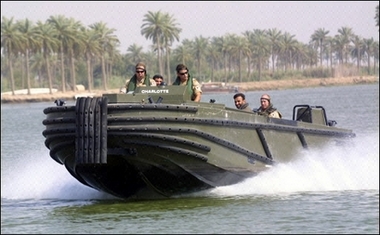Iran: Brit sailors may face charges
(AP)Updated: 2007-03-26 19:11
 British soliders patrol the waterways close to an oil terminal near the Iraqi city of Basra in 2005. [AFP]  |
"In terms of legal issues, it's under investigation," Mottaki said.
The capture and detention of the British service personnel increased tensions between Iran and the West that already were high over Tehran's nuclear program and allegations that Iran is interfering with the US-led war in Iraq.
The UN Security Council agreed Saturday to tougher sanctions against Iran for its refusal to meet UN demands that it halt uranium enrichment. Many in the West fear the country's civilian nuclear research is cover for a weapons program, a claim Iran denies.
Britain and the United States have said the sailors and marines were intercepted Friday just after they completed a search of a civilian vessel in the Iraqi part of the Shatt al-Arab waterway, where the border with Iran has historically been disputed.
Prime Minister Tony Blair on Sunday called the detentions "unjustified and wrong," and insisted during a European Union meeting that Royal Navy crew was in Iraqi waters.
"It is simply not true that they went into Iranian territorial waters, and I hope the Iranian government understands how fundamental an issue this is for us," he said.
Secretary of State Condoleezza Rice insisted during a trip to the Middle East that the Britons be released, saying "we all fully trust the British" account.
Mottaki gave no firm commitment on their release during a telephone conversation with British Foreign Secretary Margaret Beckett late Sunday.
Beckett reiterated that the sailors and marines had been searching for smugglers in Iraqi waters under an agreement with the Baghdad government when they were seized by the naval forces of Iran's Revolutionary Guard, the Foreign Office said.
"The Iranian authorities intercepted these sailors and marines in Iranian waters and detained them in Iranian waters. This has happened in the past, as well," Mottaki said.
The Iranian state news agency IRNA said that Ibrahim Rahimpour, the foreign ministry official in charge of western Europe, had told British Ambassador Geoffrey Adams that the British sailors and marines were "well and sound" and that "legal proceedings" were under way.
On Saturday, Iran's top military official, Gen. Ali Reza Afshar, said the seized Britons were taken to Tehran for questioning and had confessed to what he called an "aggression into the Islamic Republic of Iran's waters."
British, Israeli and Saudi media reports on Sunday suggested that Iran was hoping to trade them for Iranian officials it claims have been abducted by the West in recent months.
Ali Askari, former head of an elite unit of the Revolutionary Guard, disappeared in Turkey six weeks ago; several months earlier, six Iranian officials were captured by US forces at an Iranian liaison office in Irbil, the capital of the Kurdish self-ruled region of Iraq. One was later released.
Iran said it was a government liaison office. The US military said those detained were connected to an Iranian Revolutionary Guard unit that funds and arms insurgents in Iraq.
Ahmad Bakhshaysh, a political analyst and professor in politics in Tehran's Allameh University, said a prisoner swap was not what Iran wanted.
"Iran is not after retaliation regarding abduction of its diplomats. ... However, Iran will use this opportunity to show to the world public opinion that Britons were (the) invader and Iran was victim of the Westerners bullying policy," he said.
The capture of the British sailors and marines was not the first time Iranians have taken Western forces by surprise in the border area.
In June 2004, six British marines and two sailors were captured, then paraded blindfolded on Iranian television. They admitted they had entered Iranian waters illegally but were released unharmed after three days.
US News and World Report, citing a US Army report out of Iraq, said American troops working with Iraqi border guards within Iraq were attacked by a much larger Iranian military unit in September. US News said no Americans were hurt in the incident, but four Iraqi soldiers, an interpreter, and an Iraqi border policeman remain missing.
The US military said the account was accurate, adding that the incident with the American troops, who were training, advising and helping the Iraqi border police, could have been a result of confusion in the vast desert area along the border.
"There is a lot of open terrain," military spokesman Lt. Col. Mike Donnelly said in an e-mail. "Visual sighting and happenstance encounters from a distance occur routinely."
|
||
|
||
|
|
